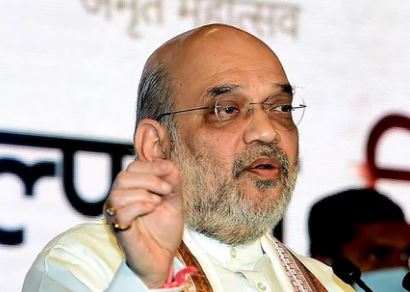Hyderabad: Union Home Minister Amit Shah Friday said the three new bills replacing IPC, CrPC, and the Evidence Act will be passed in Parliament soon, asserting that the country under the leadership of Prime Minister Narendra Modi has adopted a zero-tolerance policy against terrorism.
“There is now a need to move ahead from zero-tolerance policy against terror towards zero-tolerance strategy and zero-tolerance action,” Shah said, speaking after reviewing the passing out parade of the 75th (Regular Recruits) batch of the Indian Police Service (IPS) probationers at the Sardar Vallabhbhai Patel National Police Academy (SVPNPA) here.
He said India is dispensing with laws made during British rule and is entering a new era with new confidence and new hopes.
“The three laws made around 1850 during the British era, which are the driving force of our criminal justice system, CrPC, IPC and Evidence Act — the government has made radical changes in the three laws and placed three new laws before the country’s Parliament,” he said.
The parliamentary committee of the Home Ministry is studying them, he said, adding that very soon, these laws will be passed. The new criminal justice system will be based on these laws, he said.
“The purpose of the old laws was to safeguard the government but the purpose of the new laws is to safeguard the rights of the public and to eliminate obstacles in the people’s access to those rights,” Shah said.
The Home Minister said he feels that the batch passing out today is a lucky one as it begins the task of managing the country’s internal security with the new laws. The first responsibility of implementing the new laws in letter and spirit at the grassroots level lies with the probationers passing out today, he said adding they have to understand the spirit of these laws and keep the public safe and protect their rights as well.
Shah said that terrorism and organised crime have been reinterpreted in the new law and many provisions have also been made to eliminate inter-state gangs.
Apart from this, the police have been empowered by legalising technical provisions, he said, adding that the investigation process has been digitised and proper systems have been put in place to follow investigation charge sheet timeline and forensic provisions, he said.
Shah said a time-bound plan has been prepared to increase the conviction rate under the new laws and through these laws many changes have also been made in the justice system. The Centre had proposed the Bharatiya Nyaya Sanhita, 2023, the Bharatiya Nagarik Suraksha Sanhita, 2023, and the Bharatiya Sakshya Bill, 2023 to replace the IPC, CrPC, and Evidence Act respectively.
Though there has been success in considerable measure during the last 10 years in bringing under control terrorism, left-wing extremism, and naxal violence due to the efforts of courageous police personnel, he said, the challenges remain. Several new challenges, including organised crime, cybercrime, inter-state, and international financial crime, are before us, the union minister added.
He said the fight should be continued with the same vigour against challenges such as drug trafficking, weakening of the country’s economy by cryptocurrency, hawala trade, and fake currency business.
“In the past nine years, the Modi government achieved huge success in improving the law and order situation in the three hotspot areas of the country — North-East, Left Wing Extremism areas and Jammu and Kashmir,” he claimed.
During the 10 years from 2004 to 2014, there were 33,200 violent incidents in these three hotspots, which have been reduced to 12,000 in the past nine years, and “we have moved forward by registering a 63 per cent reduction in violent incidents and 73 per cent reduction in deaths,” he further claimed.
The Union Home Minister asked the officer trainees to move beyond “reacting-and-responding policing” to “preventive, predictive, and proactive policing” and also to transform policing with time in the changing environment. He asked the police officers to always be sensitive towards the poor and weaker sections of the country and always be proactive in protecting their rights.
Speaking about the women’s reservation bill, Shah claimed that under the leadership of PM Modi, the country is progressing rapidly in women-led development. The government has recently ensured 33 per cent reservation to women in the country’s Parliament and State assemblies, he said. “Under the leadership of the women officers passing out today, Prime Minister Modi’s theme of women-led development will percolate to every village of the country,” he added.
Speaking about upholding the security of the nation, Shah said the government has worked to create databases in every field of internal security with the principle of ‘One Data, One Entry’. Arrangements for integration and mutual communication in various databases are also being made, he said. Apart from this, work is also being done to increase the strength of all the agencies by equipping them with analytical tools, he said.
Shah asked the police officers to work through all these databases and analytical tools and to use Artificial Intelligence to always keep the police two steps ahead. Officer Trainees of 75 RR batch will have an important role in the direction of fulfilling PM Modi’s resolution of ‘Amrit Kaal’, he said.
“When the country celebrates its centenary of independence, India will be leading the world in all fields, and all these officers will also have a huge contribution in it,” he added. A total of 175 officer trainees, including 155 IPS officer trainees and 20 foreign officer trainees, took part in the Dikshant Parade. SVPNPA Director Amit Garg also spoke.
PTI
